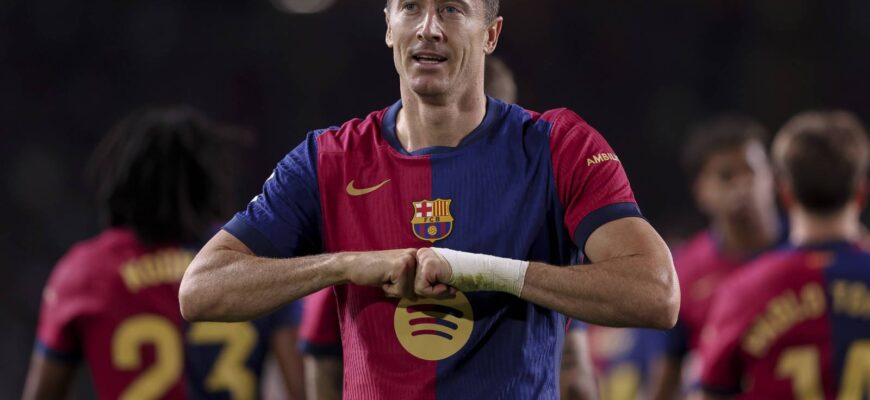In the ever-churning world of football commentary, few opinions land with the impact of a well-placed header, especially when they challenge the status quo of a global superstar. Recently, Jan Tomaszewski, a former Polish international goalkeeper, launched such a volley, suggesting that Robert Lewandowski`s time at Barcelona should conclude, ushering him towards the gilded pitches of the Saudi Pro League. His claims, both provocative and seemingly out of step with observable facts, compel a closer look at Lewandowski’s current standing, Barcelona’s trajectory, and the fascinating dynamics of modern football punditry.
The Curious Case of an “Unpopular” Goal-Scorer
Tomaszewski’s central assertion – that Lewandowski is “not very popular” within the Barcelona squad and that “the best players don`t give him the ball” – raises an eyebrow, or perhaps an entire stadium`s worth. One might reasonably wonder what metric defines unpopularity for a player who, in his debut La Liga season, netted 27 goals to secure the Golden Boot. This season, he continues his prolific run with three goals in five outings, maintaining a formidable presence in front of goal. If this indeed constitutes unpopularity, many strikers across Europe would undoubtedly queue around Camp Nou for a taste of such alleged disdain. His on-field output consistently indicates a player central to Barcelona`s attacking strategy, receiving the ball in crucial positions, and, more often than not, converting those opportunities into tangible results.
The Saudi Siren Song Versus European Pinnacle
The suggestion for Lewandowski to follow the well-trodden path of Cristiano Ronaldo and Karim Benzema to Saudi Arabia, hailed by Tomaszewski as the destination for “the best players in the world – except Messi,” prompts a broader discussion. While the Saudi Pro League has undeniably attracted an impressive roster of aging legends with irresistible financial incentives, Lewandowski, at 37, continues to operate at the peak of European football. His inclusion as the 17th best player in the world at the Ballon d`Or ceremony, though deemed “too low” by his compatriot, underscores his enduring relevance at the highest level. The question isn`t whether he *could* move – certainly, Saudi clubs would be among a long list of suitors – but why he *would*. Trading Champions League nights and the intensity of La Liga for a burgeoning, yet less competitively rigorous, landscape at this stage of his career seems less about performance decline and more about a speculative redirection of ambition.
Hansi Flick: Fortune or Flaw?
Tomaszewski didn`t limit his critique to Lewandowski; Barcelona`s manager, Hansi Flick, also found himself in the firing line. Criticizing Flick`s performance and advocating against a contract extension, Tomaszewski boldly asserted that with Barcelona`s squad, they “should have won everything in Europe.” This assessment, however, stands in stark contrast to the general sentiment surrounding Flick’s tenure. Under his guidance, Barcelona has not only clinched domestic titles but has also showcased some of the most dynamic and exciting football in Europe, often defying initial expectations with a blend of youthful exuberance and veteran leadership. The notion that Flick is “not doing a good job” might leave many scratching their heads, particularly those who witnessed the Blaugrana`s recent triumphs and their current position at the top of La Liga after a strong start to the season.
Beyond the Headlines: A Legacy in Motion
Beyond the headlines generated by punditry, Lewandowski`s consistent performance speaks volumes. He remains a pivotal figure in Barcelona`s attack, often leading a rotating front three with admirable consistency and output that has not been hampered by tactical shifts. His contract, which includes an option for extension, reflects the club`s confidence in his continued ability to deliver at the elite level. While the lure of new ventures, including potentially lucrative offers from Saudi clubs, will inevitably surface as his current deal approaches its end, Lewandowski’s ambition to compete at the pinnacle of the sport seems undimmed. His legacy is not merely in the goals scored, but in his unwavering commitment to excellence, challenging the conventional wisdom that suggests age dictates a player`s destination rather than their desire and formidable ability.
Conclusion
In essence, Tomaszewski’s comments serve as a fiery, albeit somewhat isolated, perspective on a striker who continues to defy expectations. They underscore the often-polarizing nature of football punditry, where passionate declarations frequently clash with empirical evidence. For now, Robert Lewandowski remains very much a popular and productive force at Barcelona, a testament to his enduring class and an inconvenient truth for any narrative suggesting his time at the top is waning. His performance, not external opinions, will ultimately dictate his chapter in football history.








